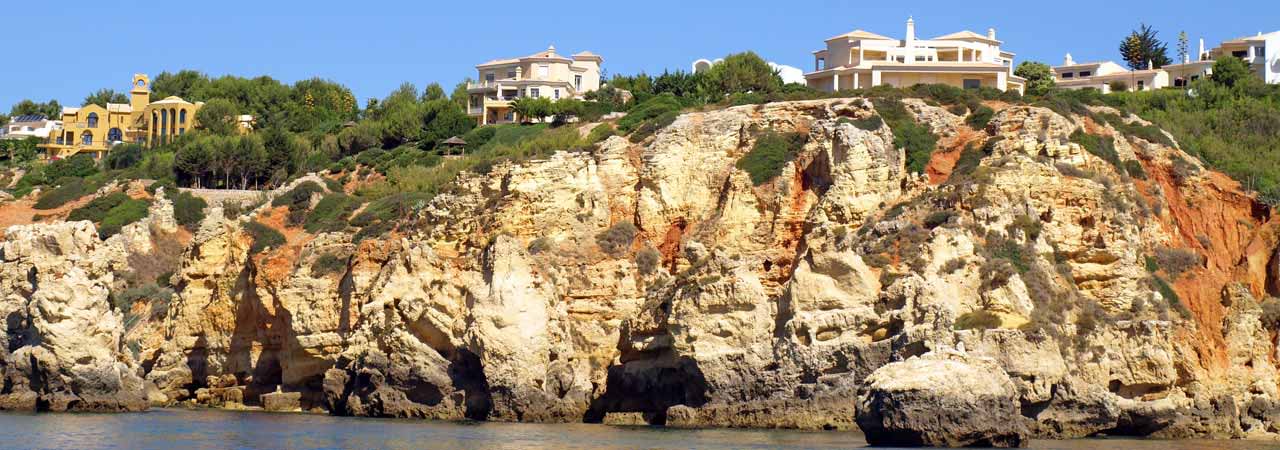The Algarve is the southern part of Portugal and runs from Cabo de Sao Vicente in the west, facing out to the Atlantic, to the Spanish border at Vila Real de Santo Antonio in the east.
The main towns of the area are Faro, where the international airport is situated, Albufeira, an attractive seaside resort with many old houses and narrow streets, Portimao, a town with a large fishing fleet and its adjacent seaside resort of Praia da Rocha with hotels, shops andexcellent sandy beaches. Further west is the town of Lagos, also with a fishing fleet and a small marina.
For those liking the smaller, quieter beaches and coves, Olhos D'Agua just east of Albufeira offers an almost perfect setting with sandy beach and rocky coves and a small village set in a ravine with excellent small restaurants which include a choice of fresh seafood. Carvoeira further west towards Portimao again offers a similar attractive setting though the village is a little larger. To the east of Faro is Tavira, an old, very historic town with fascinating buildings with unusual undulating roofs and several old churches plus a castle. On the Spanish border is the holiday resort of Montegordo with a long sandy beach and pine covered dunes behind.
The Algarve inland has a great appeal to those wanting tranquillity. The coastal plain is gently rolling with almonds, figs, vines, olives, cork trees etc. on reddish soils but behind there lies a range of mountains with the most excellent views and many small hill villages.
For yachting enthusiasts the new town of Vilamoura has a good yacht marina and adjacent is the seaside town of Quarteira with many restaurants, bars, etc. Golf courses in the area include Val de Lobo near Faro and Penina between Portimao and Lagos, but there are several other courses to choose from. Towns such as Silves, with its old castle and historic cathedral are well worth a visit.
The tiny hamlet of Caldas de Monchique, some 25 minutes' drive inland from Portimao, has a spa, several small restaurants and a very inexpensive small hotel just 5km below the town of Monchique perched right at the top of the mountains.
We have over 600 beautiful Algarve properties for sale, from beachfront apartments and villas to rustic farmhouses in the hills.
1. Signing a Letter of Intent
On finding a property you wish to purchase, your agent will draw up a 'Letter of Intent, this will be signed by both parties, vendor and buyer. Copies of this will be given to the legal representatives of both parties and will be used in preparing the Promissory Contract. Included in this letter will be the price, what is included in the sale, furnishings etc. and any conditions of the sale plus the dates for both exchange and completion.
2. Exchange of Promissary Contract (Contrato Promessa de Compra e Venda)
The buyers lawyers are responsible for drawing up the promissory contract (Contrato Promessa de Compra e Venda) and as part of the process they will have carried out the legal searches and made sure that there are no charges, e.g. utilities, property tax etc. against the property. The contract will contain details of both parties and include clear title of ownership, when payments are due to be made, the completion date and an inventory, if required. The Promissory Contract is legally binding and will generally be signed by both parties and witnessed by a notary/lawyer. The contract will include penalty clauses in case either party does not fulfill the terms of the contract. A 10%, non-refundable deposit is required at this point, this will be paid to the vendor, through the lawyer's client account. Once the contract has been signed, if the vendor pulls out of the contract, they will be obliged to pay back double the deposit to the purchaser. If the purchaser pulls out, they will lose their deposit.
3. On Completion
The amount of time between signing the Promissary Contract and Completion will vary and will have been agreed in the contract. Before Completion your lawyer will need to arrange with a fiscal representative for you to obtain a Portuguese Fiscal Number. The official Deed of Transfer of ownership (the Escritura) will be signed by you (or someone representing you with your Power of Attorney), this is signed at the Notary and they will retain the document. The Deed will be read aloud by the Notary before all participants sign it. Your lawyer will need to check to ensure that you understand what is being said if you do not understand Portugese. The Escritura, once it has been signed, will officially give you ownership of the property, but will still need to be registered in your name on the Land Registry (Registo Predial) by your lawyer. Your lawyer should obtain a copy of this for your records. Once you have completed, the new utility contracts can be transferred into your name by your lawyer.
IMPORTANT - Disclaimer :
All information provided is believed to be current and provided free of charge. No liability can be accepted for the reliability of the information and statements made as this is obtained from 3rd parties. We always recommend you take legal advice from a fully qualified Lawyer or Notary before buying a property overseas.
Close





